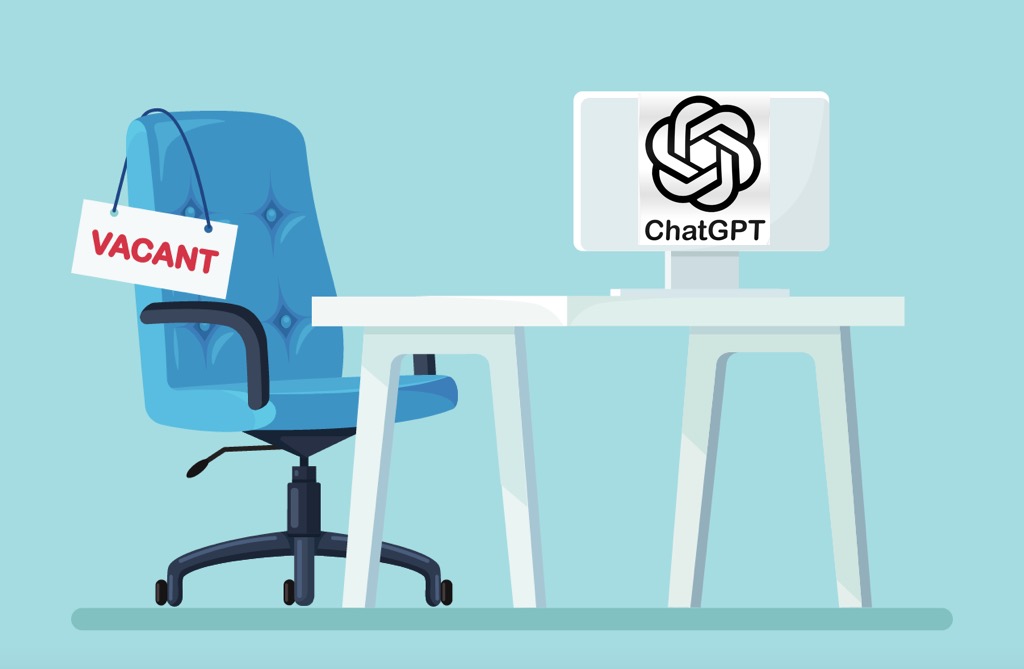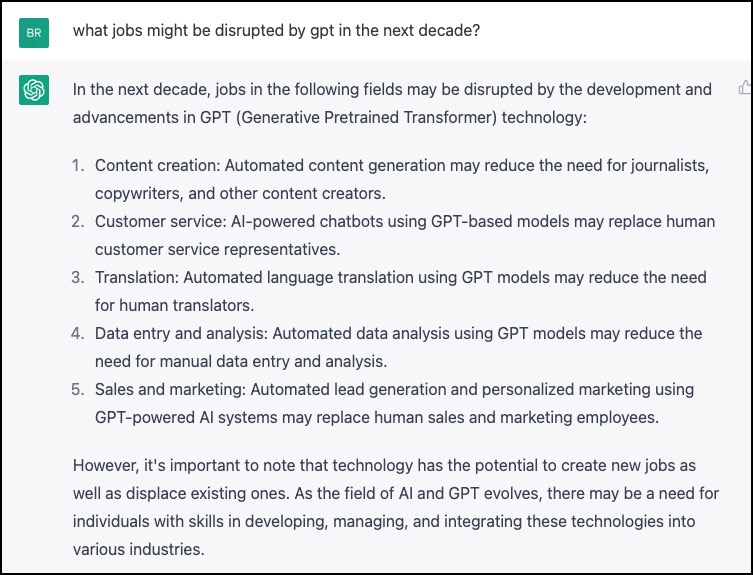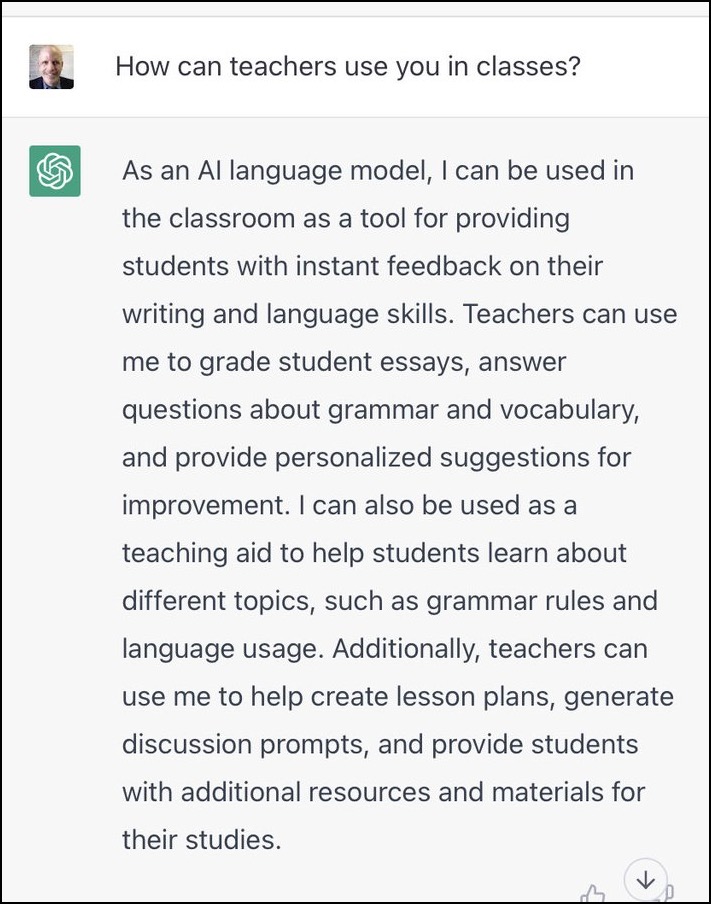
A lot of people write words. Many of them do a modest amount of research and draw on a modest amount of creativity, then they put a modest amount of work into their words. That has been enough for many people to make an adequate living until now.
New technology allows that work to be done competently and instantaneously by computers, at very low cost and with almost no human involvement. It’s already good enough and it will improve quickly. During early testing, way back in 2020, startup founder Arram Sabeti wrote: “All you have to do is write a prompt and it’ll add text it thinks would plausibly follow. I’ve gotten it to write songs, stories, press releases, guitar tabs, interviews, essays, technical manuals. It’s hilarious and frightening. I feel like I’ve seen the future.”
The next few years are going to be disruptive and some people who make a living from words are going to have a tough time.
What’s next for GPT?
ChatGPT is just a demo – a very successful one that probably got more attention than its creator OpenAI ever dreamed of.
Tech companies are racing to embed the technology (“GPT,” “generative AI”) in every tool that can support it.
GPT & AI will be inescapable buzzwords in 2023, just as “bitcoin” and “blockchain” dominated 2021. The difference is that GPT technology is useful.
(Make no mistake, there will be some very stupid products claiming to use AI in the next couple of years. It’s still the 2020s, after all. Stupid is a big part of what we do as a species these days. But a lot of what’s coming will be genuinely transformative.)
Microsoft is investing ten billion dollars in OpenAI and this week announced that a new version of its search engine Bing will be “powered by ChatGPT.” Microsoft’s Edge browser will have “AI-enhanced features.”
Google is very, very pissy that it is not in the GPT spotlight. It plans to make up for it by making it freaking clear to everyone that GPT is built on Google technology and Google is using AI in more interesting ways than anyone else and Google has the best AI technology and shut up about ChatGPT.
Google’s chatbot Bard was announced this week. It has been under development for years but Google is racing to bring a consumer-facing version online in the next few weeks. Google is holding a press conference this week to announce ways that generative AI tech will be embedded in Google Maps, Google Lens, Google Translate, and probably some new things that no one knows about yet.
My predictions:
ChatGPT is a bullshit artist that got a lot of attention because it came online at the right time to grab attention and generate endless clickbait headlines and hysteria. It will fade out of the spotlight. The real prize is the money OpenAI will make from licensing its technology to other companies.
Bing and Edge will not magically turn into good products. Don’t use Bing or Edge. Why would you?
Google’s chatbot Bard will provide higher quality responses with fewer mistakes and less hate speech. It will provide links to sources, which ChatGPT sorely lacks. Google’s other uses of AI will be less flashy but more useful than anything dreamed of by OpenAI. Today the novelty makes us give ChatGPT a pass when it makes mistakes; Google will be roundly criticized for exactly the same mistakes because, well, because Google, that’s enough for some people.
Check with me in a few months, let’s see if that’s the way it turns out.
Who will be disrupted by this new technology?
I asked ChatGPT to answer that question and got a pretty good list. I’ll drill down on some of these groups with more words that I wrote myself out of my own brain.

Journalists, bloggers, and writers for content-heavy websites
A large amount of content appears online every day with the same words written over and over with the smallest of variations. There are armies of low paid tech writers churning out material for content mills, like the hundreds of articles that appeared last week about the latest Samsung phone. Freelance journalists work frantically to complete 10 or 15 articles a day to make enough money for groceries. Sports writers cover each of the 100 baseball games every week during the regular season, dutifully recycling well-worn phrases for each homerun and strikeout. Business reporters cover earnings reports and stock market movements every day, cherry picking something in the news to explain miniscule movements in the stock market.
Their jobs will “evolve.” There will be a winding down and debates will flare for the next few years and lip service will be paid to human editing, but just saying, don’t encourage your children to grow up to be tech writers, okay? Experiments using ChatGPT to write articles have already begun at CNET and other websites that depend on a nonstop flow of content. AI produced articles will be cheaper, easier to produce, and probably better written than words produced by cranky humans. Buzzfeed announced that it intends to use ChatGPT to generate articles and quizzes. The Buzzfeed announcement came a few weeks after laying off a sizable portion of its editorial staff due to “challenging market conditions.” Coincidence? Sure. Maybe.
It’s not just journalists and bloggers. The same thing is true about many corporate jobs. PR staff write tidal waves of press releases about products, events, financial results, and executive turnover. Middle management produces memos, pitches, and Powerpoints that could all be created by ChatGPT. Customer service, oh my, yes – as if there wasn’t already enough pressure on customer service reps.
Somebody writes the articles about the weather for local newspapers and websites. ChatGPT is cheaper than that intern.
Think about scientific papers and research studies. Technical guides and product manuals. There are words everywhere.
All of it can be done by an online bot. There will be pushback because of the personal impact but the bottom-line savings will drive the trends inexorably forward.
Creative jobs
Some creativity is uniquely human. Our best authors, playwrights, screenwriters, artists, and musicians have nothing to worry about.
But creative talent is not equally distributed. Jobs will dry up for people who are merely competent at wordsmithing or creating art.
ChatGPT and its art equivalent DALL-E have proven to be very good at things that inspire a chuckle because they are incongruous – “Darth Vader ice fishing,” or “Thanos looking for his mom in Wal-Mart.” That kind of material is easy and the world will move on when the novelty wears off. New jobs will open up for people who are good at creating genuinely creative prompts for ChatGPT and DALL-E.
Advertising & marketing
There are two parts to marketing: creating advertisements, websites, and other marketing tools; and measuring their effectiveness.
This is already more complicated than you realize. The process of creating and placing ads on websites is driven by algorithms as much as creative teams. Amazon changes its page layouts constantly, dozens of times per day, tweaking fonts and buttons and page elements in nonstop adjustments to measure what attracts the most clicks. Netflix works obsessively on choosing images to display for each movie. Even small companies can do A/B testing on Amazon.
AI can take humans out of the picture completely. The algorithms can create the ads, then run tests and refine the results and discover ever more effective ways to reach us that we might not have thought of – perhaps even in ways we don’t fully understand. Analyst Eric Seufert put it this way:
“What you can do with Generative AI is that you avoid all of those preconceptions, and you also avoid some of these sort of specious associations that you might come up with as a human being. It’s like, “Well, you know what? This video had a dog in it. I bet people like dogs in these ad videos, so we put more dogs in.” And actually, it was because the color emitted by the sun on the lake in the background was a certain hue of yellow, and that would capture people’s attention. That never would’ve occurred to me. But the thing is with Generative AI, they can just sort of interpret that. These systems can interpret more dimensions to the asset than probably we can consciously recognize.”
Advertising has a definable goal: attract clicks, eyeballs, sales. AI can create the ads, run the tests, and constantly tweak the results without human bias and preconceptions.
And notice another common element of all these examples: AI does not have human frailties. It’s not emotional, it doesn’t get sick, it doesn’t take off on vacation, it doesn’t slow down because it’s sleep deprived or hung over.
There is one more group that will find their lives disrupted by the new technology. They won’t lose their jobs but their lives will be more difficult, probably very soon.
Students
Obviously. Plug in an essay prompt, get an essay; put in test questions and pass a Wharton MBA exam or the US Medical Licensing Examination.
Remote learning during the pandemic had already led to crazy test-taking conditions, with students being monitored during exams to make sure their eyes never stray to an off-screen phone. ChatGPT raises the stakes immediately and is harder to control.
ChatGPT will lead to many anecdotes about cheating, and eventually will require wholesale changes to how students learn and how they are evaluated. Professors and teachers are already confronting this new reality and developing new techniques to evaluate students. Examples: Follow-up oral exams about essays to ensure that students truly understand the material. Handwritten in-class tests instead of homework done outside of school. Examination of papers at early stages in the writing process to ensure they represent effort by the student instead of ChatGPT. Citation of sources not available to ChatGPT – textbooks, articles behind paywalls, and the like. Critiques of ChatGPT responses instead of direct conversations about source material.
You know who has some good ideas about how teachers can use ChatGPT in classes? Here’s a response from ChatGPT when it was asked that question.
That exchange captures the ChatGPT dilemma in a nutshell. Because ChatGPT’s answer is . . . pretty good!
We’ll talk more about GPT in the coming months. ChatGPT is a demo that went viral, but the underlying technology is what’s important – and it’s the real deal, change-the-world stuff. Someday you’ll look back and say, “I remember where I was when GPT first appeared.”
Or at least you’ll say that if the AI overlords allow you to speak.

